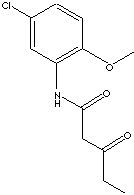| CAS
NO. |
52793-11-0
|

|
| EINECS NO. |
258-189-2 |
| FORMULA |
C11H12ClNO3
|
| MOL
WT. |
241.68
|
| H.S.
CODE |
|
| TOXICITY |
Oral
rat LD50: 2000 mg/kg
|
| SYNONYMS |
AAMOC;
|
|
Acetessig-5-chlor-2-methoxyanilid (German); Acetoacet-
5-chloro-2- methoxyanilide; Acetoacet-5-chloro-2- methoxyanilide; |
|
Acétoacét-5-chloro-2-méthoxy-anilide (French);
Acetoaceto-5-cloro-2- metossi- anilide (Italian);
N-(5-chloro-2-methoxyphenyl)-3-oxo-Butanamide;
|
|
SMILES |
|
|
CLASSIFICATION
|
DIKETENES
/
|
|
PHYSICAL AND CHEMICAL PROPERTIES
|
| PHYSICAL
STATE |
white
to pink powde
|
| MELTING POINT |
|
| BOILING
POINT |
|
| SPECIFIC GRAVITY |
|
| SOLUBILITY
IN WATER |
Slightly
soluble (Ethanol: 50 g/kg , Acetic acid: 320 g/kg )
|
| pH |
|
| VAPOR DENSITY |
|
| FLASH
POINT |
|
|
APPLICATIONS
|
|
Acetoacetic acid
and its esters contain
active methylene groups which have relatively acidic alpha-protons due to H
atoms adjacent to two carbonyl groups. The reactivity of its methylene group
provide the sequence of reactions of alkylation, hydrolysis of the esters and
decarboxylation resulting in substituted ketones. AAMOC is used as an intermediate
for the synthesis of organic
Colorants (e.g. PigmentsYellow 172). Acetoacetic acid derivatives are important aliphatic parts adjoining azo dyes
and pigments.
Anisic acid, p-methoxybenzoic acid, is a part of cresol class antiseptic
compounds. It is also used as an insect
repellent and ovicide. Anisole, anisic acid,
and their deivatives are also widely used in chemical reaction as intermediates
to obtain target materials such as dyes, pharmaceuticals, perfumes,
photoinitiators and agrochemcials. |
| SALES
SPECIFICATION |
|
APPEARANCE
|
white
to pink powder
|
| ASSAY
(TITR.) |
99.0
- 100.5%
|
|
MELTING
POINT
|
91
- 93 C
|
| TRANSPORTATION |
| PACKING |
25kgs
in Bag |
| HAZARD CLASS |
TSCA
Listed |
| UN
NO. |
Not
Regulated |
| REMARKS |
|
Arylides are intermediates for organic dyestuffs and
pigments. |
